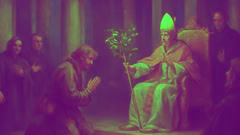Introduction
In the shadowy heart of medieval Germany, where ancient forests tangled with legend and the peaks of the Thuringian mountains stood sentinel over the land, stories took on a life of their own. Among these, none shimmered with the same combination of beauty, danger, and longing as the legend of Tannhauser. He was a knight of rare talent—a troubadour whose poetry could bring tears to the most hardened soul, and whose sword arm won the admiration of lords and ladies alike. Yet behind Tannhauser’s shining reputation lay a restlessness that neither glory nor the applause of courts could ever soothe. His was a spirit both noble and tormented, pulled between the rigid codes of his world and an ache for something deeper, something beyond the reach of mortal hands.
The land itself seemed to conspire in whispering secrets to those willing to listen. There were tales of a hidden mountain—Venusberg, where the ancient goddess Venus, banished from the world’s memory, held court in eternal twilight. Rumor claimed her realm was both paradise and prison, a place where desires took on flesh and time lost its grip. The boldest travelers spoke in hushed tones of music that could be heard from deep within the earth, luring the unwary to a fate both exquisite and terrible. For centuries, people wondered whether Venusberg was real or just a fable spun by fireside dreamers. But for Tannhauser, the boundaries between legend and life were about to dissolve forever.
It began on a night when spring was yielding to summer, and the fields around Wartburg Castle shimmered under the moon’s soft gaze. Tannhauser, weary from the endless parade of tournaments and courtly intrigues, rode alone into the wild hills. The world grew quieter with each hoofbeat, and the air thickened with the perfume of night-blooming flowers. When he reached the foot of a strange, rounded mountain—one locals avoided at all cost—he felt a pull as real as any chain. It was said no man entered Venusberg and returned unchanged, if at all. But what awaited Tannhauser inside would test not just his courage, but the very core of his soul.
The Temptation of Venusberg
Tannhauser hesitated only for a heartbeat before crossing the threshold. The stories he’d heard as a boy had painted Venusberg as a place of wild abandon, but nothing could prepare him for the world that opened beneath the mountain. The passage wound deeper, swallowing him in cool darkness until a faint glow began to pulse from ahead—a phosphorescent radiance that shimmered like the aurora against stone walls slick with moisture. The air grew heavy, scented with myrrh and something sweet and ancient.

When he emerged into the heart of Venusberg, the sight stole his breath. The chamber was vast, its ceiling lost in shadow, supported by pillars that seemed carved from rose quartz and obsidian. Waterfalls of silver trickled down the walls into pools lined with lilies, and everywhere, music thrummed—a harp’s delicate plucking, laughter like crystal bells. Women of ethereal beauty lounged upon silk cushions, their hair shining like gold and copper, their eyes aglow with mischief and promise. At their center reclined Venus herself—regal, her skin luminous, her gown the color of spilled wine and sunset clouds. Her gaze alone could unmake resolve. “Welcome, Tannhauser,” she purred, her voice both caress and command. “You’ve wandered far. Rest here, forget your burdens. Sing for me.”
He tried to protest, to summon thoughts of duty and home, but his resistance ebbed like mist in morning sun. When he sang, his verses grew sweeter, his melodies more daring. He danced in gardens perfumed with forbidden flowers, feasted on fruits that dripped nectar, lost himself in embraces that blurred the line between dream and waking. In Venus’s realm, there was no day or night—only a golden twilight where pleasure had no consequence, and pain could not touch him. He surrendered his armor and his doubts, letting desire become his only law.
Yet even in paradise, shadows gathered at the edge of his mind. As the days—or was it years?—passed, Tannhauser began to feel the weight of time anew. The laughter around him sounded hollow; the endless music, once intoxicating, now rang with a desperate pitch. The faces of Venus’s courtiers blurred together, each as lovely as the next but none offering solace. He dreamed of sunlight on the castle walls of Wartburg, of prayers echoing in cold stone chapels. Guilt gnawed at him, a reminder of vows forsaken and loved ones forgotten. Venus sensed his unrest. She sought to drown his sorrow in ever more dazzling delights, but the emptiness within him only deepened. One night, as he lay beside her in the perfumed gloom, Tannhauser found tears on his cheeks. “Let me go,” he whispered. “I long for forgiveness.”
Venus’s eyes flashed with wounded pride, yet sadness, too. “You cannot escape me,” she said, but her hold had weakened. Tannhauser stole from her chamber and fled through labyrinthine halls, following the distant sound of church bells. The mountain opened before him, spitting him out into dawn. The world outside felt changed—crisper, colder, heavy with consequence. He was a man marked by paradise and exile, desperate for absolution that seemed forever out of reach.
The Long Road to Redemption
Tannhauser’s return to the world was not triumphant but shrouded in shame. His once-brilliant eyes were haunted, and his hair had silvered at the temples—marks of time spent beyond mortal reckoning. The fields he remembered as lush now seemed faded, and the laughter of peasants echoed with suspicion. Word spread quickly that the knight-poet had wandered into forbidden places; even those who once admired him now kept their distance. Tannhauser sought solace at churches and monasteries, but their candles offered little warmth. The songs that had once won him favor now sounded hollow, even to himself.

He yearned for forgiveness—not from men, but from God. The church was the only authority powerful enough to offer absolution for what he’d done, or so he hoped. At last, burdened by longing and remorse, he set his sights on Rome. The journey was long and treacherous: mountain passes shrouded in fog, forests where wolves howled and bandits lurked, villages where suspicion greeted every stranger. Yet Tannhauser pressed on, driven by the hope that somewhere a door to redemption remained open. Along the way, he gave alms to the poor, tended wounds of the sick, and knelt in every chapel he found. Still, peace eluded him.
When he reached Rome, the city teemed with pilgrims and clergy. Its marble columns and domes loomed above dusty streets crowded with traders, beggars, and penitents. After days of waiting, Tannhauser was granted an audience with Pope Urban IV himself—a frail man whose eyes were sharp beneath heavy brows. Tannhauser knelt, confessed every shameful detail, and begged for absolution. The pope listened in silence, his hands folded in his lap. At last, he spoke: “There is forgiveness for all sins—except for yours. As little as this staff in my hand will bloom green again, so little can you be absolved.” He showed Tannhauser his dry wooden staff, a symbol of the impossible.
Crushed, Tannhauser left the Vatican in despair. Rome itself seemed to turn against him: crowds parted as he passed, whispers followed him like shadows. For three days he wandered, uncertain whether he sought death or merely escape from his torment. In the end, his heart led him back toward Germany, back toward Venusberg—toward the only place where he’d known any measure of comfort, however false. He traveled in silence, retracing the path that had brought him ruin, ignoring the fatigue that gnawed at his bones. His soul seemed emptier than ever, hope lost to the cold certainty of damnation.
But fate was not yet done with Tannhauser. Days after his departure, Pope Urban IV witnessed a miracle: his staff burst into blossom, green leaves unfurling from the once-dead wood. Horrified at his earlier judgment, he dispatched messengers across Europe to find the knight-poet and recall him to Rome. But Tannhauser had vanished, swallowed once more by legend and the shadowy mists of Venusberg. Some say he remains there still—trapped between longing and regret, forever seeking a redemption always just out of reach.
Conclusion
The legend of Tannhauser lingers in the hills of Thuringia and the ballads sung beside old castle walls. It’s a story woven from longing and regret, from the struggle between temptation and the search for redemption. Tannhauser’s journey through Venusberg’s seductive twilight and his desperate plea for forgiveness in Rome echo the human need for both passion and absolution. He was a man torn between worlds—the magical and the mortal, love’s ecstasy and faith’s stern demands. His fate warns of the costs of surrendering to desire without heed for consequence, but it also glimmers with hope: even the hardest hearts may witness miracles. If Tannhauser never found his way back, his legend endures as a reminder that forgiveness is often more mysterious—and more attainable—than we dare believe. The bloom on the pope’s staff stands as a silent promise that even the deepest wounds can be healed, if only we have the courage to seek grace.













